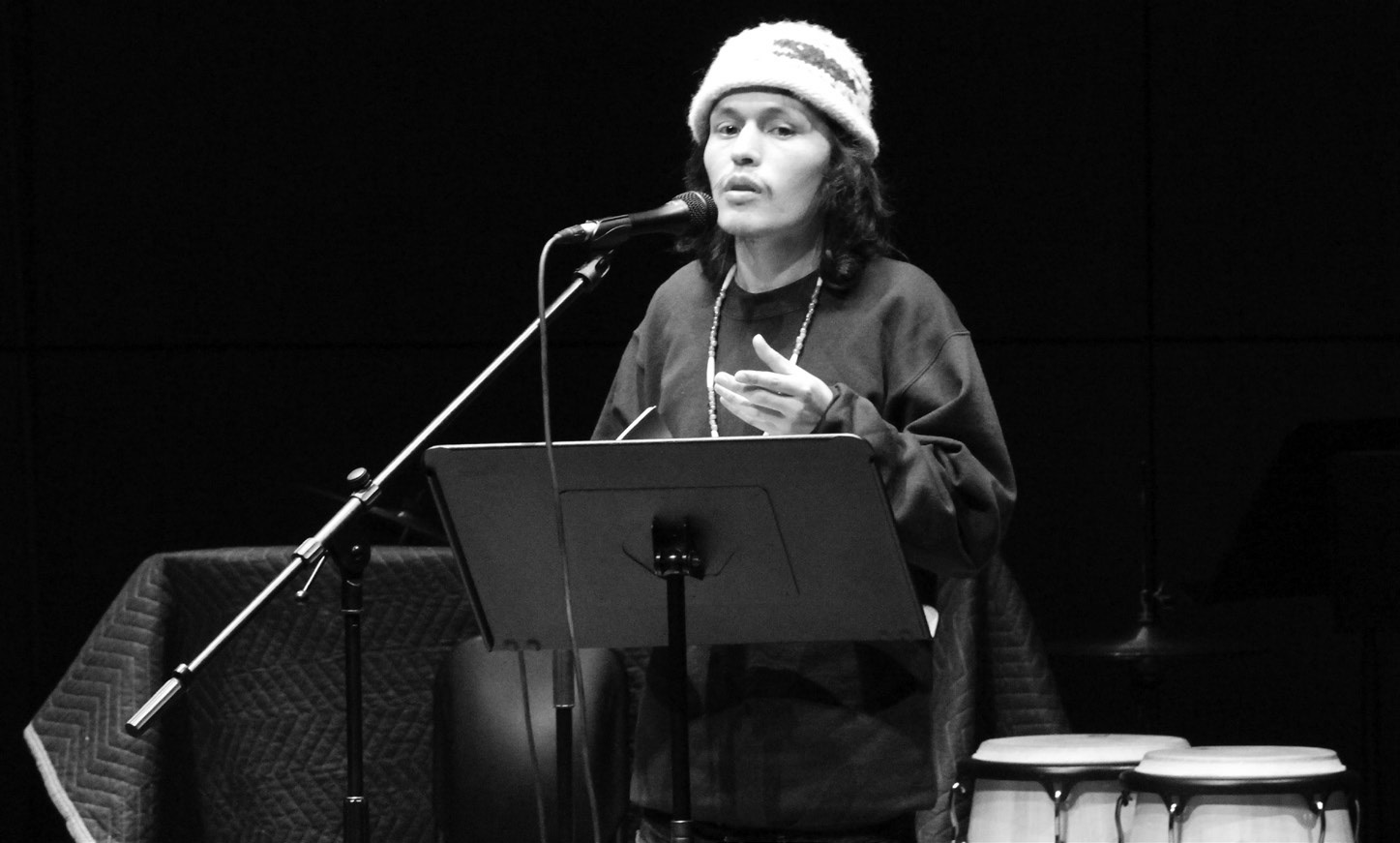
By Giovanni Roverso
JRPIII
A new poetic voice is rising in the Olympic Peninsula. It’s Makah and it has a name: John Robert Pritchard III. At age 23, Pritchard is hot off the heels of releasing his first collection of poems, dubbed “Slam Poetry – W.O.L.F.: We Only Love Freedom.”
Pritchard, a Peninsula College student, has come a long way since he began writing love poems for the girls at elementary school while growing up on the Makah Reservation in Neah Bay.
At a reading in PC’s Maier Hall on February 3 he admitted that he was a trouble child growing up. “I argued a lot with teachers. I love to debate. But I can do it in a friendly way—I guess,” he added with a wry grin at the event.
In time, and true to his outspoken spirit, his material got more historical and political. Pritchard has always stood up for his ideals which in turn have been the fuel for his passion.
Slam poetry is a young art form. It is spontaneous and unregulated, akin to rap, but tends to be more focused on socio-cultural issues and the like. The preferred definition on urbandictionary.com calls it “A type of poetry expressing a person’s personal story and/or struggle usually in an intensely emotional style. Very powerful, sincere, and moving.”

Pritchard believes in fighting against discrimination, racism, sexism and substance abuse. He believes in shaping a better more dignified future. “We’ve gotta honor our women, raise the next generation and prove that tribal people can be good.” His message, while born out of his experience as a Native American, aims to reach far and wide. He dedicated his book “to all the voiceless people around the world. You all could make a difference like Malala,”—the Pakistani girl who survived being shot by Al-Qaeda for advocating girls right to education—“all that it takes is courage.”
Since attending PC Pritchard has grown in fame after joining the student poets’ group Poetic Blood Quantum, which is facilitated by PC professors Kate Reavey and Alice Derry. Publishing for W.O.L.F. was made possible with a grant from the Bill Hennessey Native Bridges Fund and with support from the Peninsula College Foundation.
Prichard said he’s wanted to accomplish something great, “I felt like I was lying to myself about it at first, but now I’ve made it.”
At the Feb. 3 event, Pritchard announced having reached the $10’000 plus target that would allow him to pay for a trip to study in Florence, Italy, for two and a half months in spring through the Washington Community College Consortium for Study Abroad program (read more about WCCCSA after the jump).
W.O.L.F. was instrumental to gathering the necessary funding for the trip, which he hopes will contribute to his artistic and cultural maturation. He said he was especially interested in learning about Italian history and art including great poets like the Dante Alighieri who was from Florence himself.
Pritchard said recently that his application essay had been chosen as the best out of 13 total, granting him a $1000 scholarship for the trip in addition to what he is already getting through financial aid.
Valerie Conroy, coordinator of Peninsula College’s study abroad program, who has supported Pritchard’s endeavor, will be joining students in Florence for about a week half-way through the trip to make sure things are going smoothly. “I’ll be requiring John Pritchard III to give me a tour when I get there!” she said playfully.
WCCCSA
Peninsula College is part of Washington Community College Consortium for Study Abroad, which offers trips to a variety of locations around the world in spring, summer and fall. Studying abroad, while not cheap, offers students still in the two-year college environment the chance to experience a full immersion into foreign culture all while not missing out on 15 credits worth of classes.
Conroy said that usually 10 credits are taught by a community college professor from the U.S., while five other credits are taught by a local instructor, usually in a language and culture class.
In the past, English professor Kate Reavey has taught in Florence, while philosophy professor Tom grimes has taught in London.
Trips in spring are normally to Florence every other year, alternating with other destinations, such as Berlin next year. Summer trips are more affordable as they last just four weeks and are usually spent in Costa Rica and focus on five Spanish credits. The fall is similar to the spring. Trips to London tend to alternate with other destinations, this year students will be going to Barcelona.
Conroy said that in the end, students can expect an average total cost of about $1000 per week for WCCCSA trips. Students can get some support by applying for financial aid (up to $700), a very competitive Gilman grant is also available for those willing to work for it, and last but not least one WCCCSA applicant per quarter gets selected for a $1000 scholarship.
Looking past 2015, PC is considering proposals to plan more affordable trips to the old continent outside of WCCCSA. One of these proposals include a trip to Greece and Turkey for two weeks to a month for which Grimes would be teaching.
